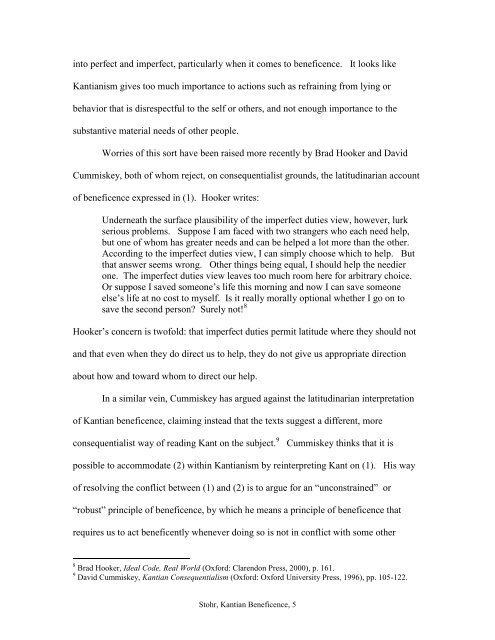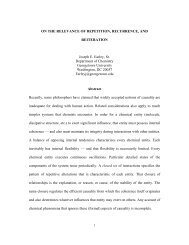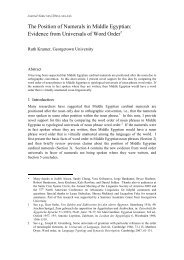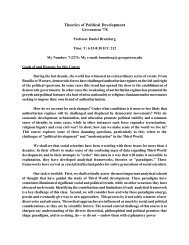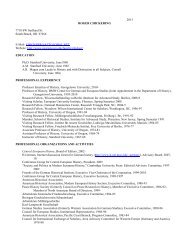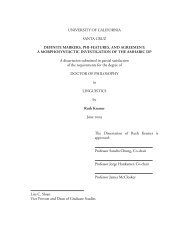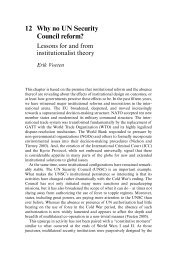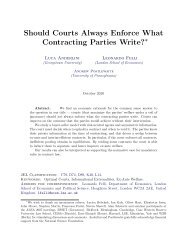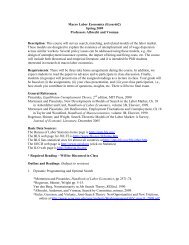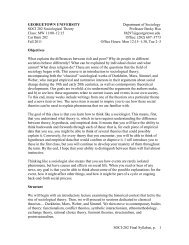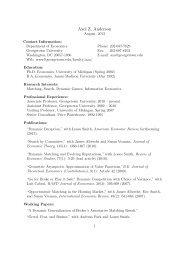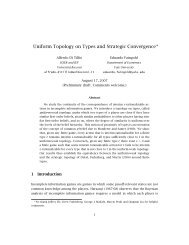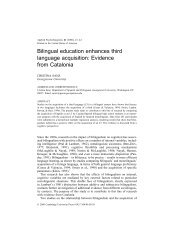Kantian Beneficence and the Problem of Obligatory Aid
Kantian Beneficence and the Problem of Obligatory Aid
Kantian Beneficence and the Problem of Obligatory Aid
You also want an ePaper? Increase the reach of your titles
YUMPU automatically turns print PDFs into web optimized ePapers that Google loves.
into perfect <strong>and</strong> imperfect, particularly when it comes to beneficence. It looks like<br />
<strong>Kantian</strong>ism gives too much importance to actions such as refraining from lying or<br />
behavior that is disrespectful to <strong>the</strong> self or o<strong>the</strong>rs, <strong>and</strong> not enough importance to <strong>the</strong><br />
substantive material needs <strong>of</strong> o<strong>the</strong>r people.<br />
Worries <strong>of</strong> this sort have been raised more recently by Brad Hooker <strong>and</strong> David<br />
Cummiskey, both <strong>of</strong> whom reject, on consequentialist grounds, <strong>the</strong> latitudinarian account<br />
<strong>of</strong> beneficence expressed in (1). Hooker writes:<br />
Underneath <strong>the</strong> surface plausibility <strong>of</strong> <strong>the</strong> imperfect duties view, however, lurk<br />
serious problems. Suppose I am faced with two strangers who each need help,<br />
but one <strong>of</strong> whom has greater needs <strong>and</strong> can be helped a lot more than <strong>the</strong> o<strong>the</strong>r.<br />
According to <strong>the</strong> imperfect duties view, I can simply choose which to help. But<br />
that answer seems wrong. O<strong>the</strong>r things being equal, I should help <strong>the</strong> needier<br />
one. The imperfect duties view leaves too much room here for arbitrary choice.<br />
Or suppose I saved someone‟s life this morning <strong>and</strong> now I can save someone<br />
else‟s life at no cost to myself. Is it really morally optional whe<strong>the</strong>r I go on to<br />
save <strong>the</strong> second person? Surely not! 8<br />
Hooker‟s concern is tw<strong>of</strong>old: that imperfect duties permit latitude where <strong>the</strong>y should not<br />
<strong>and</strong> that even when <strong>the</strong>y do direct us to help, <strong>the</strong>y do not give us appropriate direction<br />
about how <strong>and</strong> toward whom to direct our help.<br />
In a similar vein, Cummiskey has argued against <strong>the</strong> latitudinarian interpretation<br />
<strong>of</strong> <strong>Kantian</strong> beneficence, claiming instead that <strong>the</strong> texts suggest a different, more<br />
consequentialist way <strong>of</strong> reading Kant on <strong>the</strong> subject. 9 Cummiskey thinks that it is<br />
possible to accommodate (2) within <strong>Kantian</strong>ism by reinterpreting Kant on (1). His way<br />
<strong>of</strong> resolving <strong>the</strong> conflict between (1) <strong>and</strong> (2) is to argue for an “unconstrained” or<br />
“robust” principle <strong>of</strong> beneficence, by which he means a principle <strong>of</strong> beneficence that<br />
requires us to act beneficently whenever doing so is not in conflict with some o<strong>the</strong>r<br />
8 Brad Hooker, Ideal Code, Real World (Oxford: Clarendon Press, 2000), p. 161.<br />
9 David Cummiskey, <strong>Kantian</strong> Consequentialism (Oxford: Oxford University Press, 1996), pp. 105-122.<br />
Stohr, <strong>Kantian</strong> <strong>Beneficence</strong>, 5


